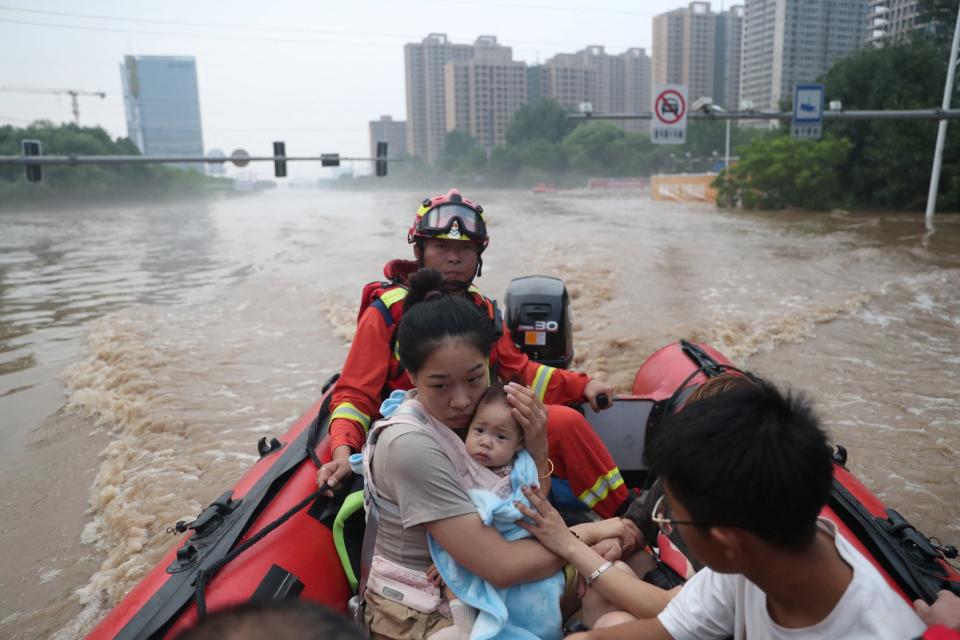Typhoon Doksuri's 2023 rampage across China leaves US$23 billion shortfall in insurance coverage, Munich Re says
Typhoon Doksuri, which triggered extreme flooding across China last summer, was one of the costliest natural disasters worldwide in 2023, leaving a multibillion-dollar shortfall in insurance coverage, according to experts.
The catastrophe caused US$25 billion in economic losses, the second-costliest natural disaster worldwide and the costliest in the Asia-Pacific and Africa region, German reinsurance firm Munich Re said on Tuesday. Only 8 per cent, or US$2 billion, of the losses were covered by insurance - far less than other major natural disasters of 2023.
The "trend [of] decreasing insurance gap, or increasing insurance penetration" of high-income countries "has not been observed to a similar degree in China," said Munich Re's chief climate scientist Ernst Rauch.
Overall, only about 5 per cent of disaster-related economic losses in China were insured in 2023, a slight increase from around 3 per cent a few years ago but still well below the global average of 38 per cent, the company said. The situation leaves Chinese families and businesses vulnerable to increasing damage as climate change exacerbates extreme weather.

A woman holds a baby as rescuers evacuate residents stranded by floodwaters following heavy rainfall in Zhuozhou, Hebei province, China, on August 2, 2023. Photo: China Daily via Reuters alt=A woman holds a baby as rescuers evacuate residents stranded by floodwaters following heavy rainfall in Zhuozhou, Hebei province, China, on August 2, 2023. Photo: China Daily via Reuters>
The reinsurance firm called for China to push for broader adoption of natural-disaster insurance.
"The challenge is that the demand is not there," Rauch said. "Consumers do not necessarily understand the benefit of insurance and how it helps individual livelihoods under natural disasters. All stakeholders, including the private sector, the insurance companies, and the governments, have a responsibility to inform people of how to protect themselves from such risks."
As 2023 smashed global heat records to become the hottest year ever, natural disasters cost the world US$250 billion, the same level as in 2022, according to Munich Re. The largest disaster was a June earthquake in Turkey and Syria that caused US$50 billion in overall losses, with around US$5.5 billion of that insured.
The gap between overall economic losses and insured losses has widened, with only 36 per cent, or US$90 billion, of global losses covered by insurance in 2023, compared with 50 per cent of 2022's US$250 billion and 42 per cent of the five-year average of US$210 billion between 2018 and 2022, according to Munich Re.
Unlike in previous years, such as 2022 with Hurricane Ian, which hit several South American countries and part of the United States, a large number of small to mid-sized events drove economic losses from natural disasters in 2023.
Storms accounted for insured losses of more than US$100 billion in 2023, with severe thunderstorms being the main contributor, according to a report by the Swiss Re Institute last month. Losses from severe thunderstorms have steadily increased by 7 per cent annually in the last 30 years.
"The cumulative effect of frequent, low-loss events, along with increasing property values and repair costs, has a big impact on an insurer's profitability over a longer period," said Jerome Jean Haegeli, Swiss Re's group chief economist. The high frequency of severe thunderstorms in 2023 has been an earnings test for the primary insurance industry, he said.
According to Munich Re, 76 per cent of overall economic losses last year were weather-related, while 24 per cent had geophysical causes.
"The warming of the earth that has been ongoing for many some years is changing the probability and intensity of extreme weather in many regions, leading to increasing loss potentials," said Rauch. "Society and industry need to adapt to the changing risks - otherwise loss burdens will inevitably increase."
The human toll from 2023 disasters was far above the average due to the devastating Turkey-Syria earthquake, which killed more than 50,000 people. Overall deaths from natural disasters rose to 74,000 in 2023, from 11,400 in 2022 and the annual average of 10,000 over the previous five years, according to Munich Re.
This article originally appeared in the South China Morning Post (SCMP), the most authoritative voice reporting on China and Asia for more than a century. For more SCMP stories, please explore the SCMP app or visit the SCMP's Facebook and Twitter pages. Copyright © 2024 South China Morning Post Publishers Ltd. All rights reserved.
Copyright (c) 2024. South China Morning Post Publishers Ltd. All rights reserved.

 雅虎香港財經
雅虎香港財經 